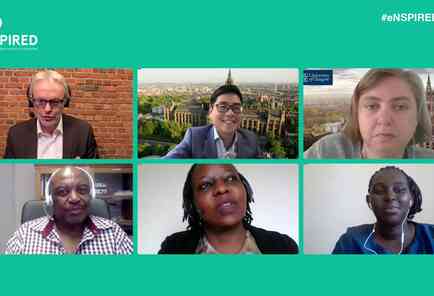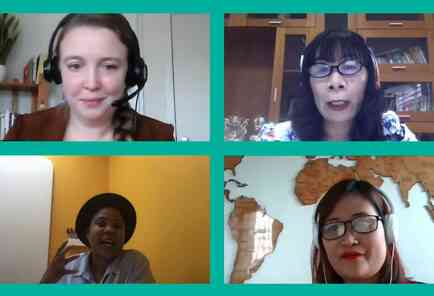On 21 October, you can participate in a webinar on professional learning communities (PLCs) where the results of an international literature study will be presented together with practical stories.
REGISTER HERE
Therefore, VVOB is currently commissioning a literature study that will answer the following questions:
REGISTER HERE
What is a professional learning community?
A PLC is a group of teachers, school leaders and/or teacher educators who work together, exchanging experiences and sharing knowledge. PLCs allow teachers to collectively determine their own learning goals and trajectories. PLCs can be used to discuss, test, and reflect on educational innovations and how they can be translated into classroom practice.Literature review on PLCs in Africa, Asia and South America
Inclusive and quality education provides all learners with opportunities to develop sustainable skills, contribute to peaceful and democratic societies and increase individual well-being. Professional learning communities (PLCs) are important for quality education as they play an important role in the professional development and motivation of teachers and school leaders. After all, education cannot be of a higher quality than the teachers who teach it. VVOB has a long history in strengthening the professional development of teachers and school leaders by implementing professional learning communities in various countries in Africa, Asia and South America.Therefore, VVOB is currently commissioning a literature study that will answer the following questions:
- How are PLCs defined?
- How and by whom are PLCs initiated?
- Are PLCs effective as an instrument for the professional development of teachers and/or school leaders?
- Are effective PLCs sustainable?
- Are PLCs costly?
- What advice can we give to policymakers for each of the above questions?
PRACTICAL
- On Thursday 21 October 2021 from 13:30 to 15:00 (GMT+2 | Brussels time)
- Livestream (you will receive the link after registration)
- For (pre- and in-service) teacher trainers, (future) teachers and school leaders, but also other people who are interested are welcome.
- All presentations will be in English. Simultaneous translation into Dutch is provided.
- Participation is free but registration is required (see below).
- The webinar will be recorded and can be watched afterwards. Please register to have easy access to the recording.
THE GUEST SPEAKERS
Dr. Dong Nguyen is a lecturer in Educational Leadership in the School of Education, University of Glasgow, United Kingdom. He is known for his research in educational leadership and professional development and learning for school leaders and teachers. He has published three systematic reviews in education. His literature reviews and empirical research have addressed important aspects of professional learning communities such as teacher collaboration and teacher change.Professor Ellen Boeren specialises in adult education. She has 15 years of experience in working on large international educational projects. For example, she recently managed the Scottish team in the EUR 2.5 million Horizon 2020 project ENLIVEN – Encouraging Lifelong Learning for an Inclusive & Vibrant Europe. She works as a consultant on the European Commission’s working group on adult education and training and has undertaken a secondment with the OECD’s Directorate for Education and Skills in 2016-2017. In 2019, she edited UNESCO’s Fourth Global Report on Adult Learning and Education (GRALE 4) (with Professor John Field). The report contains a wide range of recommendations on adult education both in the Global North and South based on a survey with over 150 UNESCO Member States. Professor Boeren is editor of Adult Education Quarterly. Her experience in conducting literature reviews is evidenced by her monograph ‘Lifelong learning participation in a changing policy context: an interdisciplinary theory’ for which she won the Cyril O. Houle award for outstanding contribution to the adult education literature in 2017.
Ms. Nathalie Aziza is a professional in Education with 11 years of experience in Professional Development of School leaders and teachers, early grade learning and basic education. She has successfully led and managed the development and implementation of Education programs. She holds an M.A in Development Studies and a B.A in Education. She is currently working with VVOB in Rwanda as Education Advisor to support and advise on the implementation of Effective School leadership and Management through professional learning communities.
Mr. Paul Mphisa works for VVOB in South Africa as a Programme Advisor. He has been working in the education field for more than 20 years working as a teacher, researcher and project manager in various areas of education for different organisations. Since joining VVOB in 2016 he has focused on teacher education and the capacity development of District Officials. Of particular interest for him has been the role of Professional Learning Communities (PLCs) in continuous professional teacher development (CPTD).
Brenda Akite Otika oversees government relations and partnership work in Uganda. She has experience designing training materials for teachers and officials under the STiR programme. She was intrigued to join STiR Education because of the great belief they had in the teacher as the solution and not the problem to the learning crisis. Previously she has worked with Women of Uganda Network, an international organisation that empowers women and youth to achieve sustainable development through ICTs.

